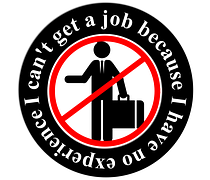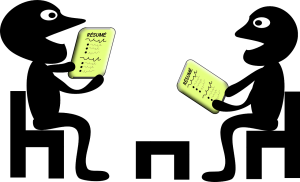 The elaboration of the curriculum vitae is one of the most important steps on our way to professional success in Germany. A good CV by itself will not get us the job, but it’s essential to create a positive first impression in the recruiter. A bad CV, on the other hand, could put an end to all our options to move forward in the selection process. Tweet #EmpleoAlemania We present below a small list with some of the most common mistakes that candidates make in their résumés when searching for a job in Germany. Even if some of them may seem pretty obvious, it’s actually complicated to find someone who doesn’t commit at least one of these errors in his CV.
The elaboration of the curriculum vitae is one of the most important steps on our way to professional success in Germany. A good CV by itself will not get us the job, but it’s essential to create a positive first impression in the recruiter. A bad CV, on the other hand, could put an end to all our options to move forward in the selection process. Tweet #EmpleoAlemania We present below a small list with some of the most common mistakes that candidates make in their résumés when searching for a job in Germany. Even if some of them may seem pretty obvious, it’s actually complicated to find someone who doesn’t commit at least one of these errors in his CV.
- MISTAKE: Overestimating the amount of time the recruiter will dedicate to your CV. On average, a recruiter uses 6 seconds in order to form a first impression of the résumé. Therefore, an excessively long CV, with a too complex structure or with an unattractive design will always play against us.
- SOLUTION: Make it easy for them. Put the information where the recruiter expects to find it. Create a visually appealing CV but don’t be too creative with the design, unless the position you are applying for requires some extra creativity (graphic design, for example). In Germany the résumé is usually structured in the following subsections: personal information
 (Persönliche Daten), work experience (Berufserfahrung), education (Akademische und schulische Ausbildung) and other qualifications such as languages (Sprachkenntnisse), IT-knowledge (EDV-Kenntnisse) or additional training (Weiterbildung). It is possible to additionally include a section of interests related to the corresponding job position (Berufsbezogene Interessen). The information is organized in two columns with the dates to the left and on reverse chronological order, without leaving any gap in your professional life unexplained. The photo is usually placed on the upper right corner (next to Persönliche Daten) and in the end of the CV date and signature are included. The length of the résumé should not exceed two pages.
(Persönliche Daten), work experience (Berufserfahrung), education (Akademische und schulische Ausbildung) and other qualifications such as languages (Sprachkenntnisse), IT-knowledge (EDV-Kenntnisse) or additional training (Weiterbildung). It is possible to additionally include a section of interests related to the corresponding job position (Berufsbezogene Interessen). The information is organized in two columns with the dates to the left and on reverse chronological order, without leaving any gap in your professional life unexplained. The photo is usually placed on the upper right corner (next to Persönliche Daten) and in the end of the CV date and signature are included. The length of the résumé should not exceed two pages.
- MISTAKE: Making grammatical or spelling errors. If German is not your mother tongue it’s possible your writing in the CV will not be perfect when using this language. These grammar or spelling mistakes may seem small or not too important, but they could probably put an end to your application.
- SOLUTION: Play it safe. Ask some friend with a good German level to review your CV before sending the job application. Another possibility is to entrust a professional with the translation of the CV into German. Anyway, avoid sending a German résumé if you are not completely sure that it’s perfect in terms of grammar and spelling. If you don’t know German, for certain specific qualified positions sending the CV in English could be acceptable.
- MISTAKE: Transmitting a lack of seriousness. Even if an employer doesn’t explicitly state that a photo should be included in the CV, it’s advisable that you do it, and not in any way. Using a football comparison, a bad photo in a résumé would be a goal allowed on the first minute and from which it would be hard to come back. “Selfies”, blurry photos, with a poor lighting or with an inappropriate pose could transmit an image of lack of seriousness. Another element that also contributes to create that “not serious” image of you would be a too informal e-mail address or one not directly related to your name.
- SOLUTION: Invest on a professional photo and include a formal e-mail. The German CV-photo culture shouldn’t be overlooked when applying for a position in this country. Ideally, you would invest a bit of money to have your photo with the right characteristics taken by a professional photographer. Regarding the e-mail address, forget about diminutives, nicknames or supposedly funny words; the German recruiter will definitely not laugh at them. If you have to create a new more serious e-mail address only for this job application, do it.
- MISTAKE: Trying to “embellish” the CV too much. Exaggerating knowledge and skills is a classic of CV-making. We can sometimes fall too much into self-praise, which is not particularly well seen in Germany. Besides, it is not adequate to spend too long writing about our accomplishments and tasks in past companies, especially if we are not able to synthesize and organize this information in an attractive way.
- SOLUTION: Be neutral and get to the point. The recommendation here is clear: do not claim to have an ability that you wouldn’t be able to prove when needed. The German recruiters expect a certain neutrality in the résumés; they want to see the facts, in a clear way and without excessive “decoration”. Additionally, when describing your past professional experiences do not add too much information and just describe your tasks and accomplishments with a simple list of 4-5 short sentences, using action verbs on participle or infinitive (“management”, “planning”) and ordering them according to their importance for the position you are applying to.
We will keep publishing more information on the German job market and job search procedures. We will also do it regularly through Funk Radio. Meanwhile, we suggest that you visit regularly our section of job offers in Germany to check if any of the active offers suits your interests. Text: Aitor Sendino Fernández
Leave a Reply
Трябва да влезете, за да публикувате коментар.